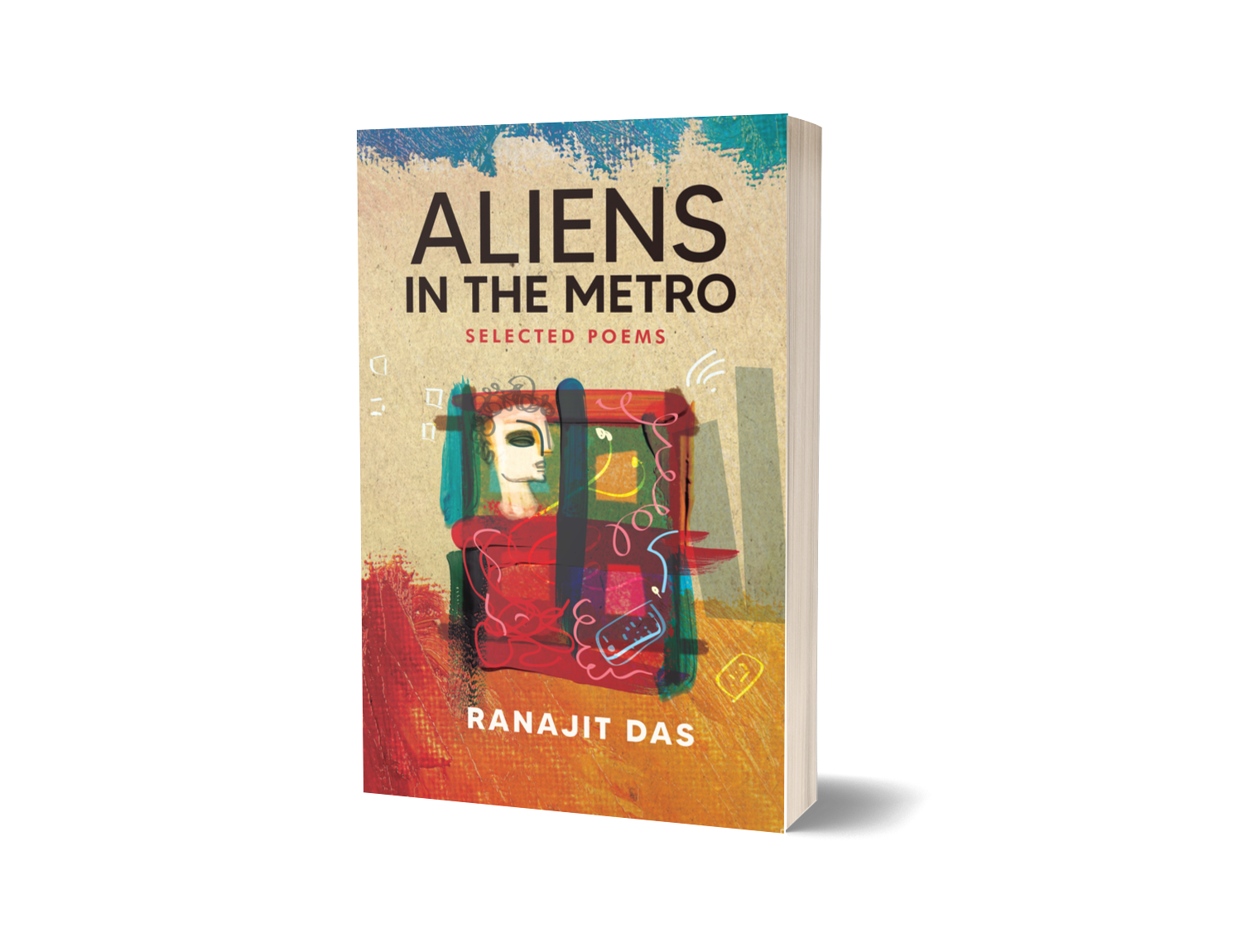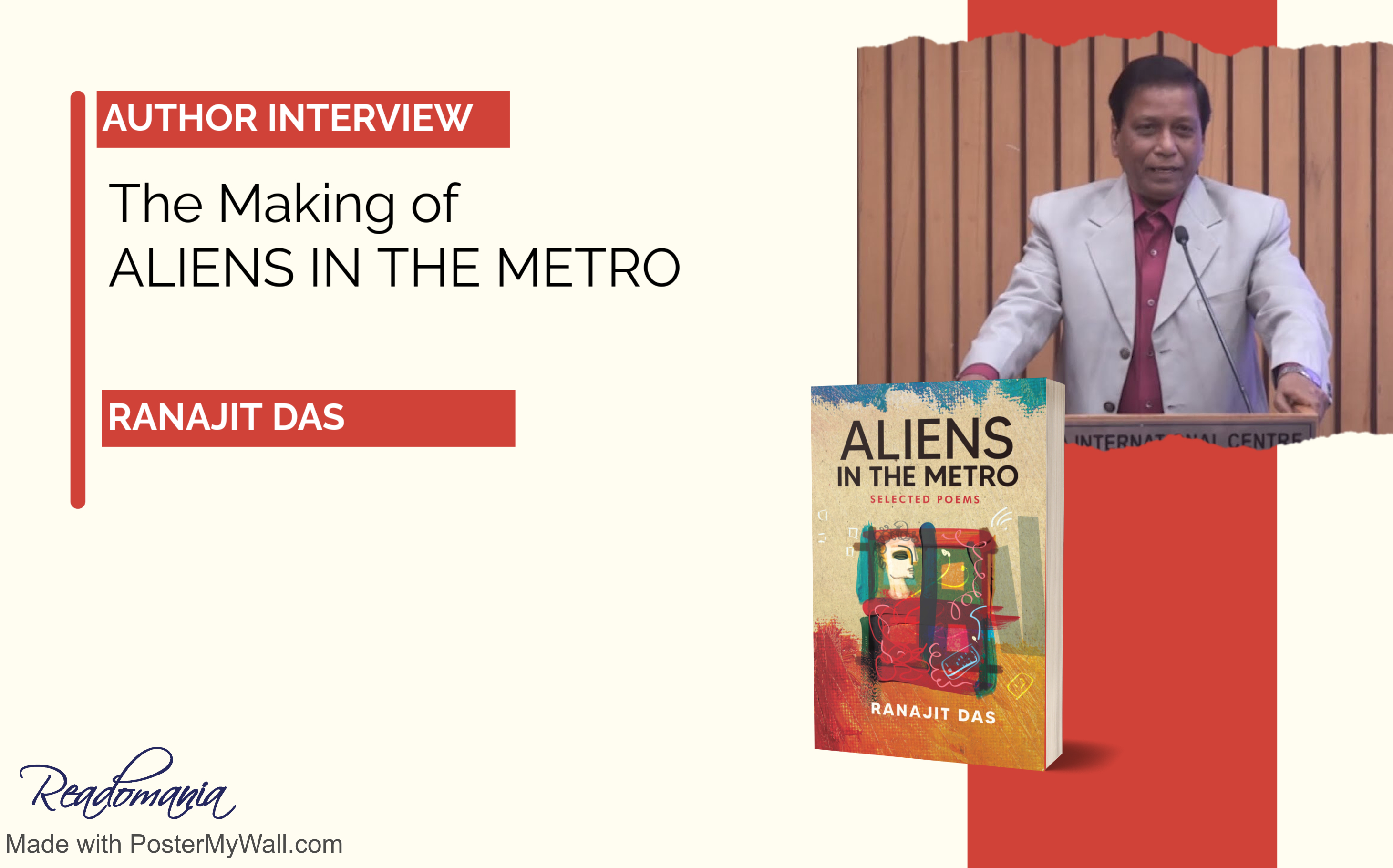Congratulations Mr Das on the launch of your poetry book Aliens in the Metro!
Readomania: What inspired you to explore the themes of politics, erotica, science and philosophy in your poetry? Are there specific experiences or influences that shaped this perspective?
Ranajit Das: I think all these themes are related to the worldview of a poet and hence belong to the domain of his poetry. Besides, poets do not actually explore various themes in a premeditated manner in their poetry; rather, they respond organically to various experiences of life, and depict these responses in their poems. These responses vary according to the individual temperaments of poets. Some poets respond very inwardly to capture only private poetic emotions. Some poets are prone to respond broadly to the myriad realities of the world in order to apprehend both its mystery and its music. As a poet, I belong to the latter kind, and hence my poetic interests are varied and wide.
Readomania: You tackle large existential issues in your work. How do you balance these weighty themes with the everyday joys of life?
Ranajit Das: In a sense, poetry is fundamentally existential, because it tries to express the essence of human existence. And if the word ‘existence’ has any meaning in the first place, it is in the feeling of joy to be alive. This experience of joy––nice, little, ordinary, ceaseless, quintessential, everyday joy––is the foundation of human consciousness. As has been stated in the famous sloka of the Upanishad: ‘It is from joy (ananda) that all that exist are born / And it is to joy that all depart and are withdrawn.’ Unfortunately, the truth of this feeling of existential joy being ever-present in every human heart is denied in modernist doctrine based on the concepts of despair, alienation and extreme individualism. Most ironically, it has become glamorous to be gloomy in the high street of modern literature!
Contrary to what you have said, this feeling of joy is the weightiest (and the lightest) existential issue!
Readomania: As someone who has translated your own work, what challenges did you face in capturing the essence of your poems in Bengali?
Ranajit Das: I write in a lucid form, and therefore my poems are relatively easy to translate. But what I have always found interesting as a translator of my own poems is the fact that whenever I start translating a poem of mine from Bengali into English, the distinctly different poetics of the English language becomes very active in my mind, and tempts me to recast my poem in the idiom and images of that poetics, to make it more alive in the target language! This secret temptation almost provokes me to commit an ‘adultery of poetics’ while translating my own poems! And I gain the startling insight that a poem is not written by the poet alone, but also by the massive influence of the poetic tradition of a particular language working on him while he is writing a poem in that language.
Readomania: You studied science and worked as a bureaucrat. How does your background and culture inform your poetry? What aspects of Bengali culture do you think resonate most with your readers?
Ranajit Das: Studying science broadened my understanding of the physical laws of nature governing the universe, and helped me to ponder more objectively about butterflies and black holes, rainclouds and stolen kisses!
And living the life of a bureaucrat provided me with a decent disguise to conceal my private life as a poet. Basically I am averse to the bohemian type of a poet being impulsive, unruly and self-obsessed, as I take poetry to be a serious vocation that demands discipline, dedication and a great deal of privacy.
You might feel amused to know that during the greater part of my bureaucratic career of 32 years, I managed to conceal my poetic identity in the service. My colleagues always knew me as a regular, boring bureaucrat who did not resemble in the least the popular image of a carefree Bengali poet. Only towards the end of my career, when one celebrity poet (who is a dear friend of mine) came to my office on a few occasions to chat with me and to collect my poems for a prominent magazine, the poetry section of which he then edited, that my colleagues got the clue and were amazed to know that I am a poet too!
As regards the aspects of Bengali culture, I think it is my strong passions and my urban voice with a global outlook that worked well with my readers.
Readomania: Eroticism is the central force in your poetry. How do you see it functioning as both a literal and metaphorical element in your work?
Ranajit Das: Sorry, I beg to differ. Eroticism is definitely not the central force in my poetry. This factor has been over-hyped, and needs to be corrected. I am certainly a poet of erotic love, but that is not the whole story. My poetry is primarily inspired by the wonders of nature and the mysteries of human existence. If you take a close look at my recent poetry-collection Aliens in the Metro, you will find that out of the 70 poems in the book, only 10 poems deal with erotic love, while the remaining 60 poems explore very different poetic emotions and experiences of life.
Readomania: You have been writing poetry for many years now. How has your poetry evolved over the years? Are there particular moments or shifts in your life that influenced this evolution?
Ranajit Das: It’s difficult to comment on the evolution of one’s own poetry, nor there is any particular need to do so. Because this job is best left to the critics and discerning readers. I might say just two things in the matter. First, I have spent my youth in the period of the Naxalite movement that dreamed of ending class exploitation and bring about an egalitarian society on the Marxist lines. But with the fall of communism in the nineties and rampant rise of the consumerist culture thereafter, I have watched in despair the downward journey of the human mind from the Oracle of Delfie to the spectacle of selfie. Secondly, I observe with alarm how even the urge for sensual pleasures, which are vital to life, is getting maimed and diminished by the addiction to the virtual world of the internet. My poetry has evolved in stubborn opposition to these declines.

Readomania: What advice would you give to new poets trying to find their voice in today’s world?
Ranajit Das: Young poets don’t bother much about any advice from older poets, as they are eager to find their own ways to make their mark in poetry, outgrowing previous trends. Having said that, I must repeat my concern about the rise of the digital in today’s world as a threat to the future of human poetry. How young poets are going to cope with it is a major challenge facing them. I notice with alarm that AIs are already writing poetry, and according to a recent newspaper report (The Telegraph dt. 18-11-2024), a chatbot called Chat GPT 3.5 have allegedly written poetry better than Shakespeare and Eliot (imitating their own styles) according to a general readership survey for being ‘more straightforward and accessible than the works of prominent poets’! Moreover, given the fast-approaching technological advance of creating direct interface between the human brain and the computer, it might soon become impossible to determine whether a poem, apparently written by a biological poet, is a 100 percent human poem, or is it mingled with the mechanical lines of a chatbot inside the computer linked to the poet’s brain. For me, it’s a nightmarish scenario.
Therefore, I have just one humble request for young poets. Please protect your creative solitude (forged in the real world) most fiercely against the forces of the virtual-digital, and stay close to the vital energy of the natural world to constantly recharge your creativity. So that in any moonless night, you can feel confident and capable of writing a line like this: Tonight I can write the saddest lines! Remember that exactly one hundred years ago, a shy, young Chilean poet wrote this stunning line in his slim book of verse titled Twenty Love Poems and a Song of Despair (1924), and later became world-famous and won a Nobel Prize! And this particular line was headlined in a major newspaper of America, and remains one of the most celebrated lines of modern poetry. And wherefrom did that young poet, Pablo Neruda, derive his amazing poetic power? It’s from the majestic wilderness of Chilean forests, hills and the seas. And also remember that this said book of verse has since sold into millions of copies (translated in all major languages) worldwide, and is regarded as one of the highest-selling books of the world, after The Bible. Just think of it! A mere collection of just 21 poems in Spanish by an unknown young poet living in the wild backwaters of Chile would become one of the most celebrated poetry books of all time. This is the power of poetry. This is the power that Mother Nature bestows on us, who chose to follow the path of poetry in her magical universe.
Readomania: Thank you for talking to us, Mr Das! We wish you continued success in your writing endeavours. The book is available on Amazon. Click here
 Ranajit Das is an eminent, award-winning Bengali poet, known for his authentic urban voice and striking originality. He has published twelve books of poems, two collections of literary essays and one novel. His poetry collections include Amader Lajuk Kabita, Ishwarer Chokh, Sandhyar Pagol, Asamapta Alingan etc.
Ranajit Das is an eminent, award-winning Bengali poet, known for his authentic urban voice and striking originality. He has published twelve books of poems, two collections of literary essays and one novel. His poetry collections include Amader Lajuk Kabita, Ishwarer Chokh, Sandhyar Pagol, Asamapta Alingan etc.
An earlier collection of his poems in English translation titled A Summer Nightmare and Other poems was published in 2011. He has also edited a large collection of poetry from Bangladesh titled Bangladesher Shrestha Kabita in 2009. His collection Aliens in the Metro was published by Readomania in 2024.
He has received the prestigious Rabindra Puraskar in 2013. His numerous other awards include Birendra Chattopadhyay Memorial Award (1994), Paschimbanga Bangla Academy Award (2010) and Ramanath Bhattacharya Literary Foundation Award (2019). He has read his poems at different national and international meets. He visited Croatia in a literary tour in 2012.
Born in 1949 in Silchar, Assam, he is a B.Sc. from Guwahati University. Later he moved to Kolkata and worked in the West Bengal Civil Service from which he voluntarily retired in 2006. He lives in Kolkata with his wife and son.


Comments